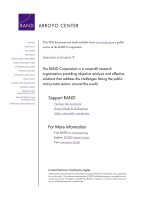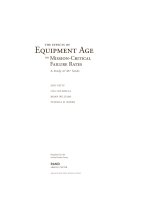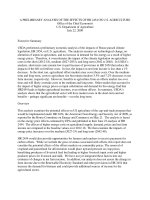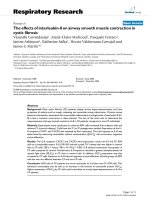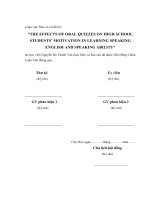THE EFFECTS OF ORAL QUIZZES ON HIGH SCHOOL STUDENTS’ MOTIVATION IN LEARNING SPEAKING ENGLISH AND SPEAKING ABILITY
Bạn đang xem bản rút gọn của tài liệu. Xem và tải ngay bản đầy đủ của tài liệu tại đây (743.72 KB, 190 trang )
Luận văn Thạc sĩ với đề tài:
“THE EFFECTS OF ORAL QUIZZES ON HIGH SCHOOL
STUDENTS’ MOTIVATION IN LEARNING SPEAKING
ENGLISH AND SPEAKING ABILITY”
do học viên Nguyễn Hà Thanh Vân thực hiện và báo cáo đã được Hội Đồng Chấm
Luận Văn thông qua.
Thư ký Ủy viên
(Ký tên) (Ký tên)
GV phản biện 1 GV phản biện 2
(Ký tên) (Ký tên)
Cần Thơ, ngày……… tháng ………. năm ……
Chủ tịch hội đồng
(Ký tên)
DECLARATION
The thesis entitled “The Effects of Oral Quizzes on High School Students’
Motivation in Learning Speaking English and Speaking Ability” is conducted under
the supervision of Dr. Thai Cong Dan, at Department of Foreign Languages, School
of Social Sciences & Humanities, Can Tho University.
I hereby declare that the information reported in the present paper is the
result of my own work, except where due reference or citation is made. The current
thesis has not been accepted for any other degree or diploma.
Supervisor Researcher
Thái Công Dân, Ph.D. Nguyễn Hà Thanh Vân
iv
ACKNOWLEDGEMENTS
The present study has been completed with the support and encouragement
of many people. I am deeply indebted to all of those who have contributed to the
success of my study.
First and foremost, I would like to express my deepest gratitude to my
supervisor, Dr. Thai Cong Dan, at Department of Foreign Languages, School of
Social Sciences & Humanities, Can Tho University. During the time I was
conducting the present research, he provided me with useful materials and precious
advice.
I would like to extend my special thanks to Dr. Pham Thi Hong Nhung and
Dr. Ngyen Van Loi who are insightful in their invaluable suggestions and hints
which help improve the quality of the current thesis.
I wish to express my sincere thanks to all my lecturers of the Master Program
at Can Tho University for their useful knowledge and whole-hearted instructions.
I am grateful to my colleagues, teachers of English in Tran Van Bay high
school, for completing and delivering the survey questionnaires to the eleventh
grade students. I am extremely thankful to Ms. Son Kim Le for her dedication in
working as a co-examiner in the oral tests.
I deeply acknowledge to all the eleventh grade students in Tran Van Bay
high school for participating in my survey. I owe a special note of gratitude to the
students in Class 11A1 and Class 11A5 for their enthusiastic participation in the
present research.
I am deeply indebted to my classmates, Ms. Tran Thi Truc Ly, Ms. Le Ngoc
Van Thuy, and Ms. Vo Thi Ngoc Thuy, for their devotion in giving useful ideas and
comments on my research instruments. I also wish to extend my sincere
v
appreciation to M.A. Quach Tan An for providing me with useful materials and
M.A. Lam Hai Khanh for assisting me to import the data.
Last but not least, I would like to thank my parents who were always by my
side, shared difficulties and encouraged me during the time I was carrying out the
study. In fact, the thesis could not be completed successfully without their financial
and sentimental support.
vi
TABLE OF CONTENTS
Declaration iv
Acknowledgements v
Table of contents vii
List of tables xii
List of figures xiii
Tóm lược xiv
Abstract xv
CHAPTER 1: INTRODUCTION…………………………………………… ….1
1.1 Rationale……………….…………………………………………… 1
1.2 Research objectives……………………………………………… 4
1.3 Research questions……………………………………………………….4
1.4 Research hypotheses…………………………………………………… 4
1.5 Significance of the study…………………………………………………5
1.6 Organization of the study……………………………………………… 6
CHAPTER 2: LITERATURE REVIEW…………………………………………7
2.1 Oral quiz…………… ……………………………………………… 7
2.1.1 Definition of oral quiz………………………………………… 7
2.1.2 Benefits of oral quiz…………………………………………….8
2.1.3 Characteristics of quizzes versus tests………………………….9
2.1.4 Possible challenges in testing speaking skills and solutions… 10
2.2 Motivation………………………………………………………………12
2.2.1 Definition of motivation………………………………………12
2.2.2 Types of motivation………………………………………… 13
2.2.3 The roles of motivation in language learning……………… 15
2.2.4 The ways to enhance students’ motivation in speaking classes…
…………………………………………………………… .15
vii
2.3 Speaking ability……………………………………………………… 17
2.3.1 Definition of speaking ability……………………………… 17
2.3.2 The roles of speaking ability in language learning………… 18
2.3.3 Components of good speaking ability…………………………18
2.3.4 Criteria for assessing speaking ability……………………… 20
2.3.5. Techniques for testing oral ability……………………………20
2.4 The effects of oral testing on students’ motivation in learning speaking…
…………………………………………………………………………23
2.5 The effects of oral testing on students’ speaking ability……………… 25
2.6 The correlation between students’ motivation in learning speaking
and speaking ability……………………………………………………27
2.7 Summary of the literature and justification of the current study……….31
CHAPTER 3: RESEARCH METHODOLOGY……………………………….33
3.1 Research design ……………………………………………………… 33
3.2 Participants …………………………………………………………… 34
3.2.1 Teachers 34
3.2.2 Students……………………………………………………… 34
3.3 Material 35
3.4 Research instruments………………………………………………… 35
3.4.1 Main instruments 36
3.4.1.1 Motivation questionnaires……………………………36
3.4.1.2 Oral tests…………………… 38
3.4.1.3 Interview questions……………………… 41
3.4.2 Supplementary instrument 42
3.5 Procedures of data collection and those of oral quiz
implementation …………………………………………………… 42
3.5.1 Procedures of data collection 43
3.5.2 Oral quiz implementation process 46
CHAPTER 4: RESEARCH RESULTS…………………………………… … 49
viii
4.1 Research question 1: Do oral quizzes enhance high school
students’ motivation in learning speaking English…………………….49
4.1.1 Findings from the pre-questionnaire and the post-
questionnaire on the participants’ motivation in learning
speaking English ……49
4.1.2 Findings from the interview on the participants’ motivation
in learning speaking English 53
4.2 Research question 2: Do oral quizzes increase high school students’
speaking ability? 56
4.2.1 Findings from the pre-oral test and the post-oral test on the
participants’ speaking ability 56
4.2.2 Findings from the interview on the participants’ speaking
ability 59
4.3 Research question 3: Is there a correlation between high school
students’ motivation in learning speaking and speaking ability? 61
4.3.1 Findings from the motivation questionnaires and the oral tests
on the correlation between students’ motivation in learning
speaking English and their speaking ability 62
4.3.2 Findings from the interview on the correlation between
students’ motivation in learning speaking English and their
speaking ability 64
CHAPTER 5: DISCUSSIONS AND CONCLUSIONS……………………… 66
5.1 Discussions ………………………………………………… 66
5.1.1 Theoretical framework of the study ………………………… 66
5.1.2 Summary of the research results 67
5.1.3 Discussions of the findings 69
5.1.3.1 The effects of oral quizzes on the participants’
motivation in learning speaking English 69
5.1.3.2 The effects of oral quizzes on the participants’
ix
speaking ability 73
5.1.3.3 The correlation between the participants’ motivation
in learning speaking English and their speaking
ability 75
5.1.4 Pedagogical implications 77
5.1.5 Limitations of the study ……………80
5.1.6 Suggestions for further research 81
5.2 Conclusions …………………………………………………………81
REFERENCES ………………………………………………………………… 83
APPENDICES……………………………………………………….…… 94
Appendix 1 A survey on students’ motivation in learning speaking English
and speaking ability. Questionnaire for grade eleven students
…… ………………………… 94
Appendix 2 Bảng câu hỏi dành cho học sinh khối 11…………………… 97
Appendix 3 A survey on students’ motivation in learning speaking English
and speaking ability. Questionnaire for EFL teachers …… 100
Appendix 4 Extrinsic motivation……………………………………… 103
Appendix 5 Intrinsic motivation ………………….…… 104
Appendix 6 Questionnaire on students’ motivation in learning speaking
English (pilot)………………… …………………….… 105
Appendix 7 Bảng câu hỏi về động cơ học kỹ năng nói tiếng Anh của học
sinh (thử nghiệm) ………………………………………… 110
Appendix 8 Questionnaire on students’ motivation in learning speaking
English ……………………… …………………………… 115
Appendix 9 Bảng câu hỏi về động cơ học kỹ năng nói tiếng Anh của học
sinh …………………………… 120
Appendix 10 Oral test…………………………………………………… 124
Appendix 11 Marking scale………………………………………… … 126
Appendix 12 Marking sheet …………………………………………… 128
x
Appendix 13 Interview questions……………………………………… 130
Appendix 14 Câu hỏi phỏng vấn……………………….………………….131
Appendix 15 Interview transcription…………………………………… 132
Appendix 16 A typical lesson plan with the implementation of oral quizzes…
…………………………………………………………… 139
Appendix 17 Model of the researcher’s journal……………………… 148
Appendix 18 Typical researcher’s journals……………………………….149
Appendix 19 Raw calculations of the questionnaires………………… 153
Appendix 20 Raw calculations of the extrinsic and intrinsic motivation
questionnaires……………………………… ………… 162
Appendix 21 Raw calculations of the oral tests……………………… 166
Appendix 22 Raw calculations of the correlation……………………… 170
xi
LIST OF TABLES
1Table 3.1: Characteristics of the participants 35
2Table 3.2: Characteristics of the interviewees 41
3Table 3.3: The procedures of the study 43
4Table 4.1: Participants’ motivation in learning speaking English 51
5Table 4.2: Paired-Samples T-Test on the mean scores of participants’
motivation in the pre-questionnaire and the post-questionnaire 51
6Table 4.3: Participants’ speaking ability before and after the intervention 57
7Table 4.4: Paired-Samples T-Test of the mean scores 58
8Table 5.2: Summary of the correlation between the participants’ motivation
in learning speaking English and their speaking ability 68
xii
LIST OF FIGURES
1Figure 4.1: Summary of the participants’ motivation in learning speaking
English before and after the treatment 52
2Figure 5.1: Variables of the study 67
xiii
TÓM LƯỢC
Rất nhiều nghiên cứu cho thấy việc kiểm tra kỹ năng nói tiếng Anh đã góp phần thúc đẩy động cơ
học nói và khả năng nói tiếng Anh của học sinh. Trong một khảo sát ở trường trung học phổ thông
(THPT) Trần Văn Bảy, giáo viên và học sinh khối 11 cũng đề nghị rằng việc kiểm tra kỹ năng nói
nên được áp dụng với mục đích tăng cường động cơ học nói và khả năng nói tiếng Anh của học
sinh. Trong khi đó, trong phân phối chương trình của THPT không có tiết nào dành cho việc kiểm
tra kỹ năng nói tiếng Anh. Vì vậy, nghiên cứu này được tiến hành để tìm hiểu tác động của việc
kiểm tra kỹ năng nói trong giờ học lên động cơ học kỹ năng nói và khả năng nói tiếng Anh của học
sinh. Bên cạnh đó, đề tài này cũng khảo sát mối tương quan giữa động cơ học nói và khả năng nói
tiếng Anh của học sinh. Nghiên cứu này được thực nghiệm trong 10 tuần trên một nhóm học sinh
và sử dụng cả hai phương pháp định lượng và định tính, trong đó việc kiểm tra kỹ năng nói trong
giờ học là biến độc lập, động cơ nói và khả năng nói là các biến phụ thuộc. Đối tượng tham gia
gồm 65 học sinh khối 11 đến từ hai lớp 11A1 và 11A5 của trường THPT Trần Văn Bảy. Ba công cụ
chính được dùng để thu thập số liệu là (1) một bảng câu hỏi về động cơ học kỹ năng nói tiếng Anh,
(2) một bài kiểm tra về khả năng nói tiếng Anh của học sinh, (3) và một số câu hỏi phỏng vấn.
Ngoài ra, một công cụ phụ khác cũng được áp dụng trong quá trình thực hiện việc kiểm tra kỹ
năng nói là nhật ký giảng dạy của người nghiên cứu. Kết quả cho thấy sau nghiên cứu động cơ học
nói và khả năng nói tiếng Anh của học sinh tăng lên. Bên cạnh đó, có sự tương quan ở mức độ
trung bình giữa động cơ học nói và khả năng nói tiếng Anh của học sinh. Một nghiên cứu khám
phá thêm cũng được thực hiện để so sánh động cơ học nói bên ngoài và bên trong của nhóm thực
nghiệm đồng thời cũng khảo sát xem loại động cơ nào có nhiều mối tương quan hơn với khả năng
nói của học sinh. Kết quả cho thấy học sinh có động cơ học nói bên trong và bên ngoài bằng nhau.
Tuy nhiên so với động cơ học nói bên trong thì động cơ học nói bên ngoài có nhiều mối tương
quan hơn với khả năng nói. Kết quả nghiên cứu chứng minh rằng việc kiểm tra kỹ năng nói trong
giờ học đã có tác động tích cực đến động cơ học nói và khả năng nói tiếng Anh của học sinh khối
11 ở trường THPT Trần Văn Bảy.
xiv
ABSTRACT
A number of studies have demonstrated that oral testing contributes to enhancing students’
motivation in learning speaking and speaking ability. In a survey conducted in Tran Van Bay high
school, both teachers and students in grade eleven also proposed that oral testing should be
utilized in order to increase students’ motivation in learning speaking English and their speaking
ability. Meanwhile, in the context of high school, there were no periods for oral tests in the
syllabus. Therefore, the current research was carried out to investigate the effects of oral quizzes
(informal oral tests administered in speaking classes during less than fifteen minutes) on students’
motivation in learning speaking English and their speaking ability. It also examined whether there
was a correlation between students’ motivation in learning speaking English and their speaking
ability. The current ten-week experimental study followed a single group design with a
combination of quantitative and qualitative methods in which oral quizzes were one independent
variable, learners’ motivation in learning speaking English and learners’ speaking ability were
two dependent variables. Participants were 65 eleventh grade students from two classes (Class
11A1 and Class 11A5) in Tran Van Bay high school. Three main instruments used to collect the
data were (1) a questionnaire on the participants’ motivation in learning speaking English, (2) an
oral test on their English speaking ability, and (3) interview questions. Besides, another
supplementary instrument applied during the implementation of oral quizzes was the researcher’s
journals. The results indicated that students’ motivation in learning speaking English and their
speaking ability were enhanced after the treatment. In addition, there was a moderate correlation
between students’ motivation in learning speaking English and speaking ability. An exploratory
research was also conducted to compare the participants’ extrinsic and intrinsic motivation in
learning speaking English and to investigate which type of motivation more correlated with
students’ speaking ability. The results revealed that the participants had the same level of intrinsic
and extrinsic motivation in learning speaking English; however, the participants’ extrinsic
motivation in learning speaking English more slightly correlated with speaking ability than their
intrinsic one. The research outcomes proved that the use of oral quizzes had positive effects on
grade eleven students’ motivation in learning speaking English and their speaking ability in the
context of Tran Van Bay high school.
xv
CHAPTER 1
INTRODUCTION
The chapter firstly focuses on the rationale for the study, and then the research objectives and the
research questions follow. In addition, the research hypotheses are shaped. Finally, the
significance and the organization of the study are presented.
1.1 Rationale
It cannot be denied that English is extremely necessary for our modern
society nowadays. Ministry of Education and Training has applied the new textbook
which aims to develop all four skills (listening, speaking, writing and reading) in
which communicative skills are of great emphasis because the ability to
communicate in a second language efficiently contributes to the success of learners
not only in school but also in other aspects of their lives (Mead et al, 1985; Kayi,
2006).
Numerous researchers in education field (e.g., Lemke, 1989; Knight, 1991;
Chuang, 2009; Khamkhien, 2010) have emphasized that speaking skills are
considered as crucial parts of the language learning process because speaking skills
form the foundation for developing other language skills (Lado, 1961; Ur, 1996;
Liao, 2009). If speaking skills are neglected in English classroom, the foundation
will be destroyed and will impede the development of the other skills (Zhang et al.,
1995; Bilash, 2009). From language learners’ viewpoints, most of them also
evaluate their success in language learning based on their progress in speaking skills
(Richards, 1990; Grace, 1998; Chuang, 2009). They consider their speaking ability
as the measure of their knowledge about a language and their achievements in
spoken communication can prove their progress in language learning (Bukart,
1998).
1
As a teacher of English in Tran Van Bay high school for eight years, the
researcher carried out a survey on 535 grade eleven students and six teachers
teaching these students. The aims of the survey were to collect information about
students’ motivation in learning speaking English, students’ speaking ability as well
as to find out possible ways for enhancing students’ motivation in learning speaking
English and their speaking ability. Eight-item questionnaires were delivered to the
teachers and ten-item questionnaires were distributed to the students (See Appendix
1, 2, 3). The results indicated that most teachers (83.3%) and students (98.1%)
realized the necessity of learning speaking skills for communication and for
developing other language skills. However, half of the teachers estimated that their
students’ motivation in learning speaking English was low; similarly, 57.2% of the
students also asserted that their motivation in learning speaking English was low. In
order to increase students’ motivation in learning speaking English, both teachers
(66.7%) and students (51.4%) proposed that teachers should design more interesting
tasks. In addition, 33.3% of the teachers and 32.3% of the students suggested that
another way to enhance students’ motivation in learning speaking English was to
test speaking skills frequently in class. In terms of students’ speaking ability, 83.3%
of the teachers judged that their students’ speaking ability was poor, and 16.7% of
the teachers claimed that their students’ speaking ability was average. When being
asked to self-evaluate their own speaking ability, among 535 students, 49.7% stated
that their speaking ability was poor; 43.4% thought that their speaking ability was
average; 6.2% affirmed that they had fair speaking ability and 0.7% reported that
their speaking ability was good. According to the teachers, two reasons leading to
the students’ low ability in speaking were the lack of speaking skills in tests and
exams (83.3%) and the large number of students in each class (16.7%). Among the
students with poor speaking ability, they confided that their speaking ability was
low because of their low motivation (49.7%), the lack of speaking skills in tests and
exams (30.8%), limited time for practicing speaking English (14.8%), and their
shyness when speaking English (4.7%). According to the teachers, there were two
2
possible ways to increase students’ speaking ability: speaking skills should be tested
(83.3%), and the number of students in each class should be smaller (16.7%). For
the students, in order to improve their speaking skills, firstly teachers should design
more interesting speaking tasks (47.6%); secondly speaking skills should be tested
(42.4%); thirdly they should be allowed more time to practice speaking skills
(8.2%); and finally the number of students in each class should be reduced (1.8%).
From the statistics of the survey, it could be concluded that the eleventh
grade students in Tran Van Bay high school realized the essential role of speaking
skills in language learning and in daily life. Nevertheless, most of them had low
motivation to learn English speaking skills and poor speaking ability. The students
reported various reasons leading to poor speaking ability, yet two remarkable causes
were their low motivation and the lack of oral testing. There were several
suggestions for enhancing students’ motivation in learning speaking English and
their speaking ability proposed by the teachers and students; however, it was
strongly supported that interesting tasks and frequent oral testing might help
improve students’ motivation in learning speaking English and their speaking
ability.
A number of studies by Sook (2003), Lawtie (2004), and Xian-Long (2009)
have demonstrated that oral testing is one of the most effective ways to enhance
students’ motivation in learning speaking English. Furthermore, it was proved that
oral testing positively affected students’ speaking ability in several studies (Finch &
Taeduck, 2002; Sook, 2003; Xian-long, 2009). It was also found that there was a
positive correlation between learners’ motivation in learning speaking English and
their speaking ability in other studies of Bernaus (1995), Penelitian (2006), and
Cindy (2009).
What has been presented above illustrated that speaking skills are
indispensable for language learning and oral testing plays an important part in
increasing students’ motivation in learning speaking English and their speaking
ability. However, in the context of high school in Vietnam, there were no periods
3
for testing speaking skills in the course syllabus. As suggested by many researchers
(Dornyei, 2001; Finch and Taeduck, 2002; Lawtie, 2004; Xian-Long, 2009), in
order to maximize the positive effects of oral testing, oral tests should be classwork
activities and frequently applied in every speaking class. Therefore, in the present
study, instead of implementing oral tests, oral quizzes (informal oral tests
administered in speaking classes during less than fifteen minutes) were employed
with the hope that oral quizzes might contribute to the enhancement of high school
students’ motivation in learning speaking English and their speaking ability.
1.2 Research objectives
Because of the presented reasons above, the current research aims at finding
out
(1) whether oral quizzes enhance high school students’ motivation in
learning speaking English
(2) whether oral quizzes increase high school students’ speaking ability
(3) whether there is a correlation between high school students’ motivation
in learning speaking English and their speaking ability.
1.3 Research questions
In order to attain the research objectives, the current study intends to obtain
the answers to three research questions:
1. Do oral quizzes enhance high school students’ motivation in learning
speaking English?
2. Do oral quizzes increase high school students’ speaking ability?
3. Is there a correlation between high school students’ motivation in learning
speaking English and their speaking ability?
1.4 Research hypotheses
It was hypothesized that oral quizzes would enhance high school students’
motivation in learning speaking English and would increase their speaking ability. It
4
was also predicted that there would be a positive correlation between high school
students’ motivation in learning speaking English and their speaking ability.
1.5 Significance of the study
Speaking skills have played a vital role in language learning, and most
language learners consider speaking ability as the measure of their knowledge about
a language. In addition, motivation has been considered as one of the most crucial
factors which help promote the learning process. A lot of studies have investigated
the effects of oral testing on students’ motivation in learning speaking and speaking
ability. Nonetheless, to the best of the researcher’s knowledge, there has been no
research on the effects of oral quizzes on students’ motivation in learning speaking
English and speaking ability, which forms the significance of the current study. If
the hypotheses that oral quizzes would enhance high school students’ motivation in
learning speaking English and speaking ability become true, then the current study
is significant in several ways. Firstly, the research findings might provide valuable
literature to the issue of oral quiz which has been little studied. Secondly, it is
expected that the outcomes of the current study will be of considerable interest to
curriculum designers and might encourage them to apply oral testing in high school
English program. It is also hoped that the results of the present study will assist in
encouraging Department of Education and Training as well as school administrators
to provide teachers of English with good conditions for implementing oral testing.
Especially, the research findings will hopefully broaden the insights of high school
teachers of English into the positive effects of oral quizzes on learners’ motivation
in learning speaking English and speaking ability so that they will be aware of
employing oral quizzes in their speaking classes. Last but not least, it is believed
that the research results might contribute to the improvement in the quality of
teaching and learning English speaking skills particularly and English subject
generally in high school context.
5
1.6 Organization of the study
The thesis comprises five chapters: (1) Introduction, (2) Literature Review, (3)
Research Methodology, (4) Research Results, and (5) Discussions and Conclusions.
Chapter one introduces the rationale of the study, the research objectives, the
research questions and the research hypotheses. In addition, the significance and the
organization of the study are also included.
Chapter two reviews the literature relevant to the thesis topic in order to
establish the foundation for the current study. Concepts and previous studies
fundamental to oral quiz, motivation and speaking ability as well as the correlation
between motivation in learning speaking and speaking ability are described. The
chapter ends with the summary of the literature and justification of the study.
Chapter three describes the research methodology involving the research
design, the participants, the material, and the research instruments. Moreover, the
procedures of data collection and those of oral quiz implementation are also
described in detail.
Chapter four reveals the results of the research which aim to answer the three
research questions. All of the data from the motivation questionnaires, the oral tests
and the interview are presented.
Chapter five summarizes and discusses the findings of the study. The chapter
also includes the pedagogical implications and the limitations of the study.
Suggestions for further research and conclusions end the chapter.
6
CHAPTER 2
LITERATURE REVIEW
The chapter reviews the literature fundamental to the effects of oral quizzes on students’
motivation in learning speaking English and speaking ability. Specifically, the chapter firstly
clarifies the terms oral quiz, motivation and speaking ability. Then, studies relevant to the effects of
oral testing on students’ motivation in learning speaking English and speaking ability are
presented. Studies about the correlation between students’ motivation in learning speaking English
and their speaking ability are also introduced. Finally, summary of the literature and justification
of the current study are addressed.
2.1 Oral quiz
The section provides a general knowledge of oral quiz, which primarily
focuses on its definition, benefits and characteristics.
2.1.1 Definition of oral quiz
There are influential ways of defining the concept quiz. According to Cohen
(1994, p.31), “a quiz is not very rigorous and it is only a short test. [ ] It tends to be
more informal than a test”. Davis (1999) states that a quiz is often carried out in
fifteen minutes or less. In Oxford Advanced Learner’s Dictionary (2005), a quiz is
defined as an informal test given to students.
From the presented definitions of the notion quiz, it appears that Cohen
provides a more detail definition on the term quiz. Cohen’s definition (1994) is
shared with that of Oxford Advanced Learner’s Dictionary (2005) and is clarified
by Davis’s (1999). Meanwhile, the definition of the term oral quiz has not been
found in any research. For this reason, based on the definitions of quiz and the
nature of oral quiz applied in the present study, oral quiz is identified as an
informal oral test which is administered in speaking classes during less than fifteen
minutes.
7
2.1.2 Benefits of oral quiz
Researchers claimed that quizzes offer both teachers and students a lot of
benefits. Particularly, Cohen (1994, p.31) has presented numerous advantages of
quizzes.
+ Firstly, quizzes are constructed, administered, scored, and evaluated more
easily than tests because they are often shorter.
+ Secondly, the focus of quizzes may be quite narrow in terms of both
contents and procedures since they often relate to the class assignments and
activities.
+ Thirdly, since quizzes are presented in informal manners, quizzes may
enable test-shy students to take part in the quizzes well and help teachers assess
learners’ language abilities more naturally and accurately than a test.
+ Fourthly, both teachers and learners can receive useful instant feedback
from quizzes. For instance, after a quiz, teachers can know which items or tasks
successfully meet the assessment needs of a given class. For students, they have
opportunity to check how well they have learned in the previous or current lessons
thanks to quizzes.
+ To further emphasize the benefits of quizzes, Cohen (1994, p.35) also
added that a quiz given at the beginning of class can serve as a review of what
students learned in the last class and help students have ready emotional state to
participate in the class section. A quiz used at the end of class helps to attract
students’ attention.
Additionally, a number of researchers demonstrated various benefits of oral
quizzes in learning speaking skills (e.g., Flight, 2003; Kurzweil, 2003; Antonion &
O’Donnell, 2004; Capps 2007). Specifically, Flight (2003) argued that the
instructors can attain a lot of desirable results when they apply proper oral quizzes
such as:
+ revealing the effectiveness of the instructor’s training procedures
8
+ checking students’ retention and comprehension of what has been learned
+ reviewing material already covered by the students
+ drawing students’ interests and stimulating thinking
+ emphasizing the main points of the lesson
+ promoting active student participation, which is essential to effective
learning.
Kurzweil (2003) and Antonion & O’Donnell (2004, cited in Hughes, 2005)
found that oral quizzes provide teachers and students with instant feedback after
speaking activities. Oral quizzes can help them realize problematic areas so that
they can improve future lessons. Teachers can use oral quizzes as a means to
quickly evaluate students’ progress, and students are eager to hear their scores as
well as to receive advice from the teacher and other classmates on how to improve
their oral performances. In addition, oral quizzes can promote student interests in
their weak points and encourage them to practice their speaking skills as the term
continues. Capps (2007) added that oral quizzes can be a non-threatening and
motivational tool for encouraging students to take part in oral presentation.
In summary, it has been indicated that quizzes play a vital role in language
learning in general, and oral quizzes offer considerable advantages to both teachers
and students in teaching and learning speaking skills in particular. Therefore, more
attention should be paid to the use of oral quizzes in order to enhance students’
motivation in learning speaking and speaking ability. In reality, it appears to be
ambiguous to distinguish the terms “quiz” and “test”. The following part will
thoroughly describe the characteristics of quizzes and those of tests.
2.1.3 Characteristics of Quizzes versus Tests
Cohen (1994, p.32) pointed out several differences in characteristics between
quizzes and tests.
Quizzes Tests
• informal
• possibly unannounced
• formal
• announced
9
• brief
• easy to score, administer, evaluate
• timely, relevant
• narrow focus
• limited variety of items and
procedures
• serve to familiarize or train students
re item or task type
• immediate feedback for teachers on
how items work
• feedback for learners on how they did
on that material
• lengthy
• take time to score, administer, and
evaluate
• somewhat removed from time of
instruction
• broad focus
• variety of items and procedures
• seen as the measurement itself - not
training
• too late to do anything re poor items/
tasks - just discount them
• too late for learners to do anything
about their weaknesses
2.1.4 Possible challenges in testing speaking skills and solutions
Many teachers of English are afraid of testing speaking skills because they
may face several challenges. Below are possible problems that teachers might
encounter when testing speaking skills and their solutions.
The first problem originates from the difficulty in establishing criteria for
evaluating a speaking test. Even though criteria are best designed, the subjectivity
of marking may lead to unreliable results (Kitao & Kitao, 1996; Hingle &
Linington, 1997). To resolve this problem, specific criteria should be designed
according to the purpose of the test to ensure the reliability of the oral test. In
addition, in oral tests, there should be two examiners to minimize the subjectivity of
marking. Especially, time and effort should be devoted to examiner training and
standardization. Finally, it is suggested that examinees’ performances should be
recorded so that the examiners may listen to the recordings and mark again in case
there is a great discrepancy in scoring between the two raters (Fulcher, 2003).
10
Time limit also becomes one of the most concerns for teachers when
conducting oral testing. In fact, it is hard to test a large number of learners in a
relatively short time (Heaton, 1988; Seligson, 1997). The solution to this challenge
is that teachers may assess students in pairs or in groups to save time. Besides,
using group competition as a form of oral test may become a good idea because
teachers can save much time and the students will put more efforts to win other
groups.
Another difficulty in testing speaking skills is that candidates are not familiar
with the instructions when being tested at the first time (Hingle & Linington, 1997;
Christman, 1999). There are several ways to settle the problem. First of all, teachers
should inform all of the students that they are being assessed and remind them that
their efforts will be rewarded (Christman, 1999). Furthermore, students should be
given clear and comprehensible instructions before they participate in the oral tests.
For instance, the tester should describe the test purpose, predict the possible
duration of the test, outline the tasks involved in the test and give instructions at the
beginning of each task (Underhill, 1992).
The final challenge when conducting oral testing arises from candidates’
anxiety. In many situations, the candidates may be unable to provide an accurate
picture of their oral ability because of their anxiousness (Underhill, 1992; Ohata,
2005). In fact, many studies have supported that anxiety results in worse
performance of the students. Therefore, teachers should attempt to find out as many
ways to reduce students’ anxiety as possible. For example, friendly environment
helps support students to speak correctly and eagerly (Zhao, 1998). Testers’
supportive attitudes such as body language, smiling faces, and encouraging gestures
can contribute to a relaxing testing environment (Ohata, 2005). Moreover, it is
suggested that testers should avoid taking notes on the testees’ performances
because it might cause stress for the testees.
11
In short, although it is unavoidable to face several problems in testing
speaking skills, it is believed that high school teachers of English can conduct oral
testing successfully since the solutions to these challenges are available.
2.2 Motivation
It cannot be denied that motivation plays a significant role in determining
success or failure in language learning (Dörnyei, 2001, Quashoa, 2006; Ebata,
2008). The present section comprises the definition, the types and the roles of
motivation. Moreover, the ways to enhance students’ motivation in speaking classes
are also discussed.
2.2.1 Definition of motivation
Although the term motivation is widely recognized, it appears to have been
impossible for theorists to attain consensus on its definition. According to Gardner
(1985, p.10), motivation is charaterized as “the extent to which an individual works
or strives to learn the language because of a desire to do so and the satisfaction
experienced in this activity”. Oxford and Shearin (1994, cited in Abisamra, 2009)
describes motivation as a desire to achieve a goal, combined with the energy to
work towards that goal. From Dörnyei’s viewpoint (2001), motivation explains the
reasons people decide to do something, the efforts they are going to pursue it and
the time they are willing to keep up the activity. From the presented definitions, it is
transparent that there has been a good deal of variation in the literature in the way in
which the term motivation has been defined. It is important to note that these
definitions are not contrary to one another, but rather complement each other in
clarifying the concept of motivation. Within the scope of the current paper,
motivation is considered as the willingness, need and desire of students to
participate in the learning process (Bomia et al, 1997). This definition is adopted as
the definition for the term motivation in the present study because it is the most
comprehensive and the most relevant to language learning context.
12

